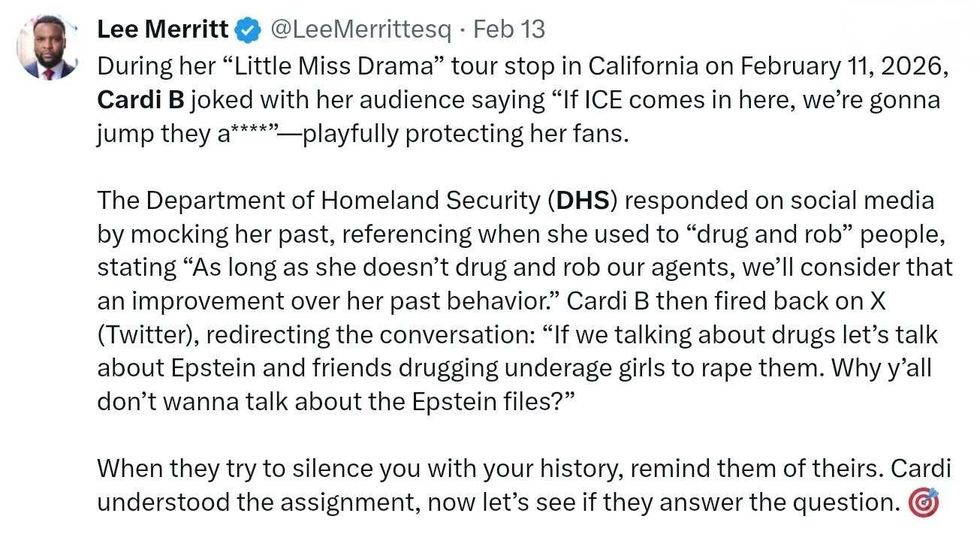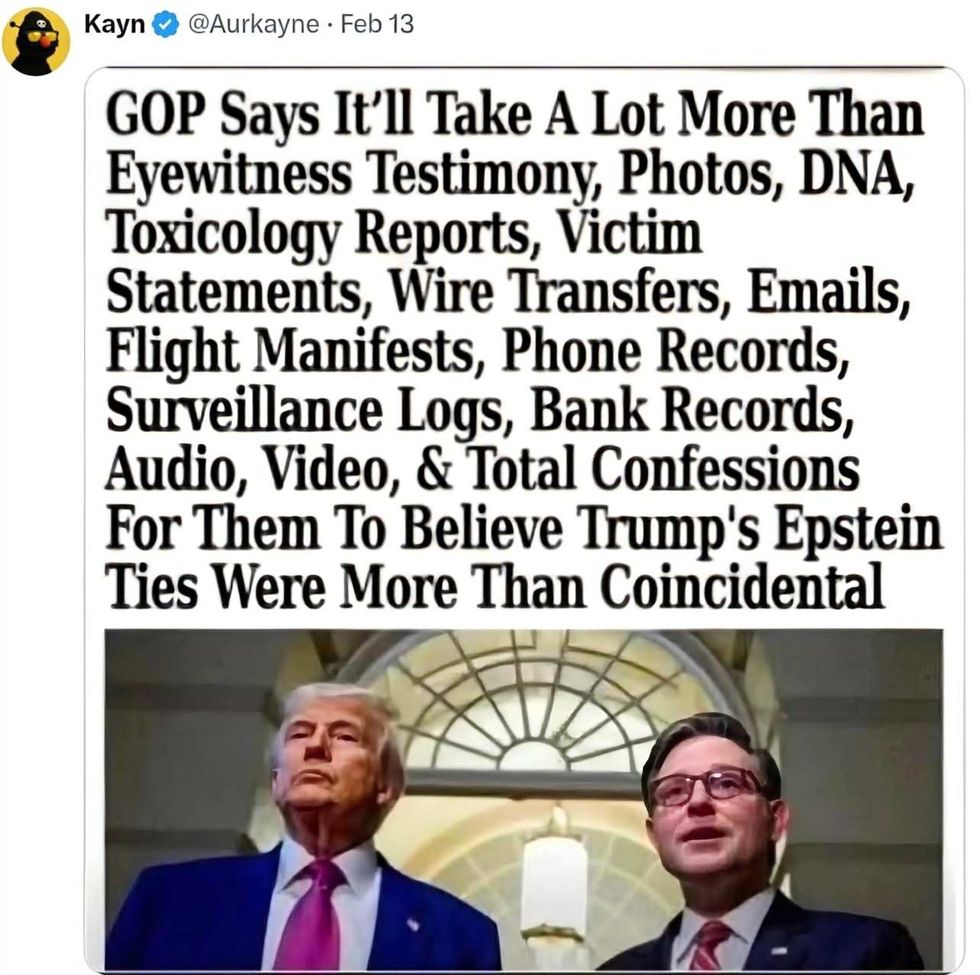Hoo boy. This story is peak 2022.
The GOP has no shortage of “colorful” characters in its House caucus, from QAnon conspiracy peddlers like Georgia Republican Representative Marjorie Taylor Greene to gun-toting Christian Nationalists like Colorado Representative Lauren Boebert to professional trolls under federal investigation for sex trafficking like Florida Representative Matt Gaetz.
I could go on.
But the latest character to emerge is New York Republican Representative-elect George Santos—if that’s even his real name. Reporter Benjamin Dryer aptly described Santos as “the love child of Marco Rubio and Kari Lake” and now it’s hard to unsee.
Santos’ story is perhaps the weirdest I have ever written about…and I’ve covered Hershel Walker. But welcome to late stage Republicanism.
Santos, 34, describes himself as a gay (sorry, fam) Latino Republican—a rare combination of identities that may be the only true things about him.
In November, he ran again for a House seat in a race he had lost in 2020, but this time he won as part of the GOP wave that swamped suburban districts in the state of New York. His victory helped Kevin McCarthy attain a narrow majority in the House.
But voters in his district are fuming after the New York Times published an exposé suggesting that almost nothing about Santos’s resume is actually true. Let’s review some of what smells really rotten.
Apparent Lies About His Background
Santos claims he graduated from Baruch College, but neither the Times nor a separate investigation by NPR could confirm this. The school told NPR it had found no match for a George Santos born July 22, 1988 with a graduation year of 2010.
A biography of Santos on the National Republican Congressional Committee’s website also claimed he attended NYU for a time, but the university found no record of his attendance and according to the Times that claim is not repeated anywhere else.
Santos has stated he worked for both Citigroup and Goldman Sachs as a “seasoned Wall Street financier and investor,” but both companies told the Times they had no record of him working for their firms.
Santos supposedly ran “Friends of Pets United,” a non-profit that rescued 2400 dogs and 280 cats, but the Times could find no record of that organization ever existing as a tax-exempt charity.
Santos even claimed in an interview with WNYC Public Radio that four of his employees died in the Pulse Nightclub shooting in Orlando, Florida, in 2016, but the Times could find nothing linking any of the victims to companies or firms associated with Santos.
This claim is particularly galling, if untrue, because it amounts to leveraging the real pain and deaths of others for political gain.
All of this points not to a rags-to-riches story of success, but to a conman who pathologically lied his way into his position. Now, it might be highly unethical to outright lie about your entire CV while running for Congress, but it’s probably not illegal.
So it’s worth also noting there are some extremely shady facts around Santos’ finances and criminal background worth exploring too, which could land him quickly in legal trouble and even force a resignation.
Where Does His Money Come From?
On the surface, Santos looks and acts like a person of great means. He lent his campaign $700,000 for his midterm election and donates extensively to other candidates.
He reported a $750,000 salary and dividends of over $1 million from his company, Devolder Organization, which Santos has described as his “family firm” that does “capital introduction consulting” with over $80 million in 13 different real estate assets.
Here’s where things get weird.
The Devolder Organization has no website or LinkedIn profile, and the Times could find no record of these real properties nor any disclosures of any of its consulting clients—a problem under election law if such clients actually exist.
Also, while Santos reported between $1 million and $5 million in dividends on his Congressional disclosure form for 2022, this compares with just $55,000 in income he reported from a different employer when he ran for the same seat two years earlier.
That’s quite a jump.
A separate investigation a year ago by Talking Points Memo, conducted after Santos made up a story about gas prices, raised some serious questions about the Devolder Organization. The company appears to have been first registered by Santos in May 2021, but then it ceased to exist in September 2022 due to failure to file annual paperwork.
If the records are correct, as Josh Marshall of TPM noted:
“[S]ometime between his first and second run in 2020 and 2022 Santos became a millionaire super fast with a company that seems to have no paper trail besides a Florida corporate registration that lapsed after one year for not filing an annual report.”
Then, surprise, surprise, just days ago on December 20, 2022, according to a follow-up report by Talking Points Memo, Santos filed documents to have his company reinstated.
Is Santos trying to cover his tracks?
Where did all that money come from, and who is behind it? Does he really have a wealthy family, or is he being secretly financed by third parties? And why has he not disclosed any of this?
Adding to the smoke is the fact Santos is apparently a fugitive from the law in Brazil. The Times reported Santos faced criminal charges for stealing checks at age 19 from a man his mother was caring for and making fraudulent purchases with them.
Two years later, at age 21, Santos confessed to the crimes and was charged, but then didn’t respond to an official summons and could not be located at his given address, according to a Brazilian court representative.
This time period overlaps with the time Santos claims he was attending Baruch College, which again has no record of his attendance.
So What Happens Now?
It’s extremely frustrating that these reports of Santos’ fabricated resume, shady finances and criminal record are coming out only now, weeks after the election. The Democratic Party and Santos’ general election opponent have committed what amounts to political malpractice by not surfacing any of this through standard opposition research.
There are already calls for Santos to resign and for a federal investigation, particularly over his financial disclosures and whether he has committed election fraud by failing to report, or by misreporting, his sources of income and his supposed clients.
It would come as no surprise to many if it turned out Santos had one or more big financial backers, perhaps even foreign ones, who really don’t want their identities to be known.
For his part, Santos issued a statement which blasts the New York Times for having it out for him but failed to rebut any of the allegations or provide any information to support his biographical claims or financial disclosures. Santos’ office is likely in damage control mode, but it’s hard to see how this problem just goes away.
Looking at the larger political picture, Kevin McCarthy is unlikely to take action against Santos, who has already pledged his support for McCarthy to be Speaker.
McCarthy cannot afford any more defections or lost votes at this time, so we aren’t likely to see him do the right thing here, namely to refuse to seat someone who has lied his way into office and apparently is a fugitive with a criminal past.
It will be one more example of the party accepting the very worst candidates in order to achieve the votes it needs to hang on to power.
To add to the gross factor here, Santos recently attended a gala event in Manhattan that drew White nationalists, conspiracy theorists and European representatives of far-right parties.
Legal questions are likely to dog Santos long after he presumably is seated in January. It will be up to his district constituents and the press to keep the pressure on Santos and to hold him accountable for any lies, cons or illegal behavior.
We’ll also have to see what action the Justice Department might undertake in light of the Times report, particularly over questions around Santos’ financial disclosures, who is bankrolling him and that pesky criminal summons he fled in Brazil.















 @LeeMerrittesq/X
@LeeMerrittesq/X @bob_moss/X
@bob_moss/X @jelanijones/Bluesky
@jelanijones/Bluesky @Aurkayne/X
@Aurkayne/X @sadcommunistdog; @froglok/Bluesky
@sadcommunistdog; @froglok/Bluesky